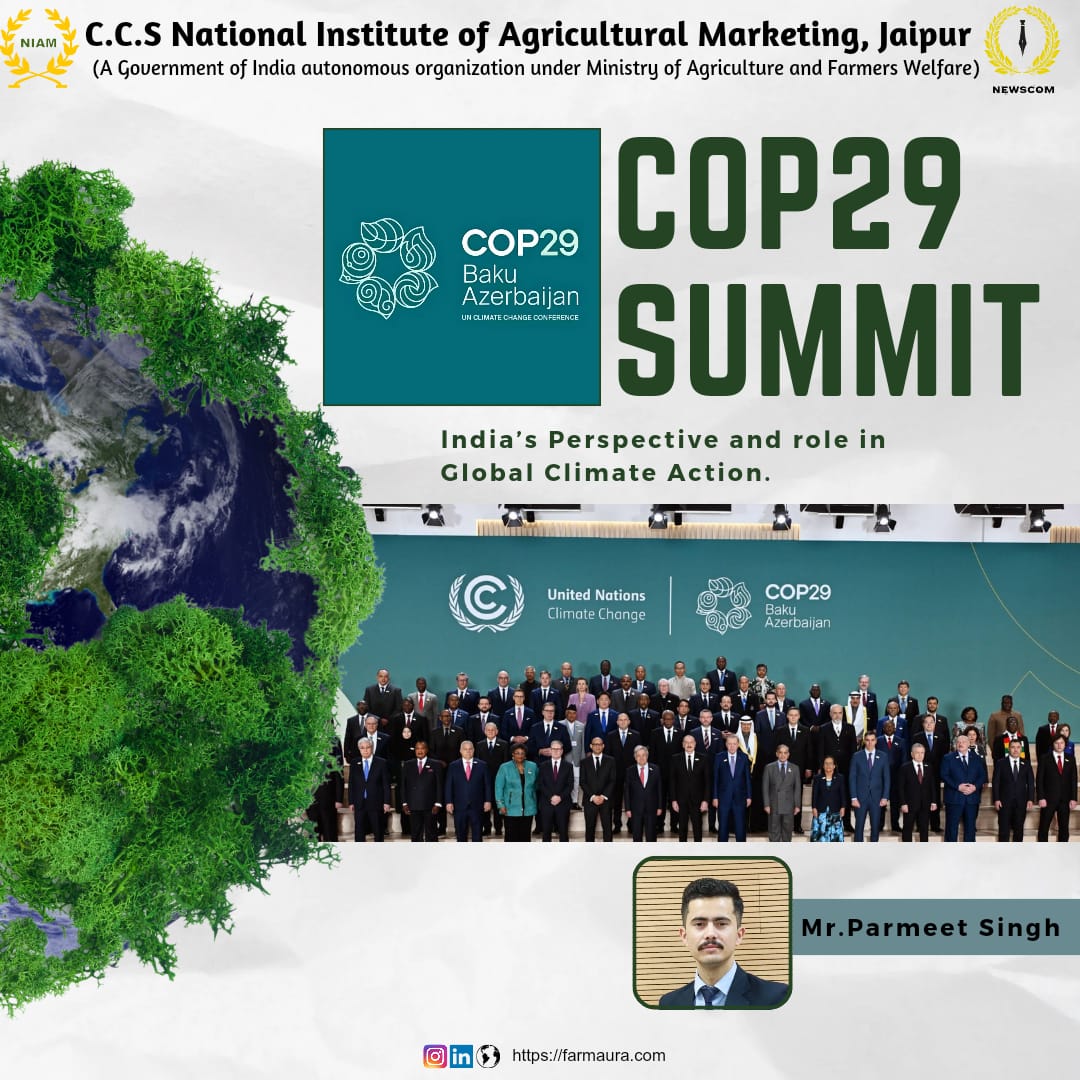The 2024 United Nations Climate Change Conference, COP29, held from November 11 to 22 in Baku, Azerbaijan, brought together representatives from nearly 200 countries to advance global climate action. The theme for the COP29 is Strengthening Ambitions and Ensuring Action. This year’s summit centered on climate finance, carbon markets, and adaptation strategies, reflecting the pressing challenges of a warming planet. While notable progress was made, the outcomes left many developing nations, including India, disappointed due to perceived inadequacies in addressing their needs.
Key Outcomes of COP29
1. New Climate Finance Goal
A significant milestone was the establishment of the New Collective Quantified Goal on Climate Finance (NCQG). The aim is to triple climate finance for developing countries to USD 300 billion annually by 2035, up from the previous USD 100 billion per year. Additionally, all sources of climate financing are projected to reach USD 1.3 trillion annually by 2035.
However, this goal fell short of expectations. Developing nations have consistently emphasized the need for at least USD 1 trillion annually to effectively combat climate change, adapt to its impacts, and address loss and damage. Many countries criticized the target as insufficient, with the timeline of 2035 deemed too distant to meet immediate and urgent needs.
2. Carbon Markets Agreement
After years of negotiations, COP29 finalized mechanisms for carbon markets under Article 6 of the Paris Agreement. This included:
- Article 6.2: Bilateral trading of carbon credits between countries.
- Article 6.4: A centralized carbon market to facilitate international cooperation in emission reductions.
This agreement represents a critical step forward in promoting global collaboration to reduce greenhouse gas emissions.
3. Global Stocktake Implementation
COP29 discussed implementing outcomes from the Global Stocktake (GST), which assessed collective progress towards the Paris Agreement’s goals. While some progress was made, there was no consensus on addressing a transition away from fossil fuels—an unresolved issue left for future negotiations.
4. Cooperative Initiatives
In addition to formal agreements, COP29 saw the launch of several initiatives, such as a declaration by over 30 countries to reduce methane emissions from organic waste. Nations like the UK, Brazil, and Mexico announced updated and more ambitious targets to achieve net-zero emissions.
India’s Opposition and Perspective
India, represented by Chandni Raina, Adviser at the Department of Economic Affairs, voiced strong discontent with the outcomes, particularly regarding climate finance. Describing the process of adopting the deal as “unfair” and “stage-managed,” Raina highlighted several issues:
- Inadequate Funding: India called the USD 300 billion per year target “abysmally poor,” “paltry,” and an “optical illusion.” This falls significantly short of the USD 1 trillion annually that developing countries require to tackle the escalating climate crisis.
- Delayed Timeline: India criticized the 2035 timeline, arguing that the financial support needed is immediate, not a distant promise.
- Reliance on Private Finance: Much of the proposed funding relies on private finance and contributions from multilateral development banks. India pointed out that private finance often gravitates toward markets offering higher commercial returns, which risks leaving vulnerable economies unsupported.
For India and other developing nations, the outcomes reinforced concerns that global climate negotiations continue to prioritize the interests of wealthier nations while underestimating the financial and technological support needed by the Global South.
Broader Disappointments
- Lack of Commitment to Fossil Fuel Transition: Despite highlighting the urgency of transitioning away from fossil fuels at previous COPs, COP29 failed to reach a consensus on this critical issue.
- Adaptation and Loss & Damage: While financial pledges were made, they fell short of adequately addressing adaptation strategies and loss and damage support, areas critical to vulnerable nations grappling with the immediate impacts of climate change.
- Energy Transition and Fossil Fuels: Controversially, COP29 failed to advance a commitment to phase out fossil fuels, largely due to opposition from oil-producing nations like Saudi Arabia. This setback disappointed many developed countries and environmental advocates, pushing these critical discussions to COP30 in 2025
Conclusion
COP29 marked incremental progress with advancements in climate finance and carbon markets but left significant gaps unaddressed. The failure to meet developing nations’ financial needs and the lack of consensus on phasing out fossil fuels underscore the challenges ahead. As the world looks to COP30 in Belém, Brazil, the call for more ambitious, equitable, and actionable climate strategies remains louder than ever. For countries like India, the focus will remain on securing climate justice and ensuring the voices of the Global South are heard and acted upon in future negotiations.




